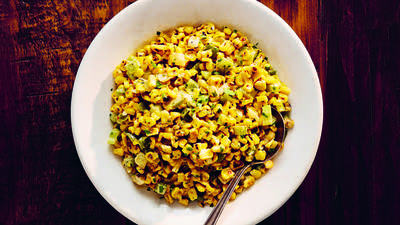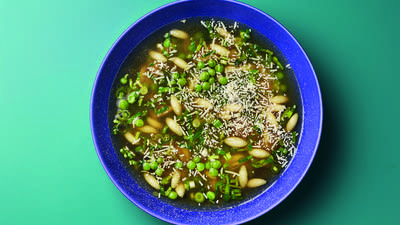
Food scientist Shirley Corriher, author of CookWise: The Whys & Hows of Successful Cooking, The Secrets of Cooking Revealed, shares four tips for keeping food fresh.
1. How to pick the best fruit
Certain fruits stop ripening the moment they are picked. Grapes, apricots, blueberries, figs, melon (with the exception of watermelon), nectarines, passion fruit, persimmons, and peaches will change in color and texture, but not in sweetness and flavor. It's especially important to taste these fruits in the store if possible (a good grocer won't mind) since what you taste is what you get.
Some fruits will continue to ripen; apples, kiwi, papaya, pears, cherimoya and, the perfect fruit, the banana, will all improve in flavor and appearance with time.
2. Keeping pesto green
When adding pesto to pasta, it can turn from bright green to a drab, mucky color. The basil is reacting with a compound in the pasta. There's a simple way to remedy this: add a little lemon juice to the pasta water before adding the pasta, or add lemon juice to the pesto. This will stop the chemical reaction and keep the pesto looking brighter and fresher.
3. Storing defrosted meats in the refrigerator
As a general rule, defrosted meat will keep as well in the refrigerator as fresh meat and the same safety rules apply. Any ground meat should be used within 24 hours, the extra surface area makes it particularly susceptible to bacteria. Chicken should also be used within 24 hours. Beef will hold longer (as long as it's fresh) because the saturated fat molecules react much more slowly.
4. Storing fresh basil
For short-term storage, store basil in resealable plastic bags. Air is the enemy here, so squeeze out as much air as possible from the bag. This should keep the basil good for up to 1 week.
There is one time-honored method from Sicily. Find a large glass or pottery jar and layer the fresh basil leaves (remove the stems but do not wash them) alternately with coarse salt. Keep the jar sealed against moisture. This will preserve the basil well into the winter months. When you are ready to use the basil, wash the salt off and use it as you would fresh.
Before you go...
Each week, The Splendid Table brings you stories that expand your world view, inspire you to try something new, and show how food connects us all. We rely on your generous support. For as little as $5 a month, you can have a lasting impact on The Splendid Table. And, when you donate, you’ll join a community of like-minded individuals who love good food, good conversation, and kitchen companionship. Show your love for The Splendid Table with a gift today.
Thank you for your support.
Donate today for as little as $5.00 a month. Your gift only takes a few minutes and has a lasting impact on The Splendid Table and you'll be welcomed into The Splendid Table Co-op.



